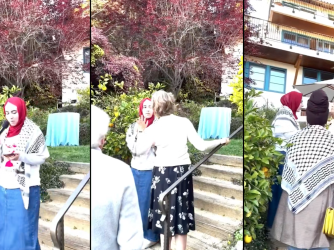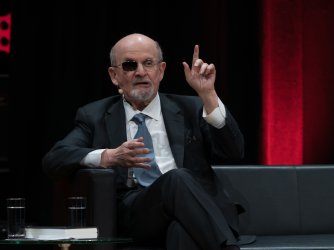Table of Contents
Tweets Used Against Student in Suspension From California College
Mt. San Antonio College has barred student Diamond Cruikshank from entering the California community college's campus due in part to a series of tweets. Her case is extensively detailed this week in the Mountaineer, a student publication of the college.
Cruikshank's saga dates back to November 17 of last year, when the radio/television major had a dispute with a professor over the use of one of the department's studios. Cruikshank, choosing a peaceful outlet to express her frustration, took to her Twitter account to broadcast the unproductiveness of their conversation. She tweeted in order "to get the frustration out of my system and then get back to work."
The professor, Tammy Trujillo, did not see things this way:
[Cruikshank's] tweets began with, "So someone with a fake grin and big ego that's way to[o] big for anyone to handle thinks I had an attitude."
Cruikshank's tweets never mentioned the professor's name.
Trujillo reported, "The student posted libelous and slanderous comments about me on her Twitter account."
Cruikshank also tweeted: "Im not going to war on this buuut don't push me, cuz then you start playing with fire and oil. I respect you so you respect me." [sic]
Trujillo reported that she perceived the tweet referencing "playing with fire and oil" as a direct threat.
Where to begin? First, there's the seemingly obvious point that legally speaking, tweets, which are written, not spoken, cannot be slanderous. (As soon as defamation is written down, it is libel, not slander.) Of course, Cruikshank's tweets don't meet the standard for defamation by any stretch of the imagination except, apparently, by Professor Trujillo's. In particular, the tweets never mentioned her by name, the practical effect being that none but a tiny handful of readers ever would have had any idea to whom Cruikshank referred. Again, we are a country mile and then some from anything resembling libel here. Finally, taking the reference to "fire and oil" as a threat is, frankly, ludicrous, nearly reaching the heights ascended by former Valdosta State University President Ronald Zaccari when he took a Facebook collage as a threat on his life and then expelled the student who had made the collage for being a "clear and present danger." The tweet, at worst, threatens an unnamed person with the great evil of disrespect.
How did Trujillo even know about the tweets, anyway? The Mountaineer reports that she was alerted to them by another student and then went went back to the studio with the department's chair, Daniel E. Smith. Following a heated twenty-minute discussion among the three (which ended with Trujillo's calling security on Cruikshank and Smith's blocking Cruikshank's path after Trujillo exited), Cruikshank left.
The next day, Trujillo filed a misconduct report against Cruikshank and followed it up two weeks later with an additional complaint including charges of "[c]ausing, attempting to cause, or threatening to cause physical injury to another person" and "[e]ngaging in expression which is obscene, libelous or slanderous; or which so incites students as to create a clear and present danger ...."
The college ultimately suspended Cruikshank from the college, prohibiting her from setting foot on campus until, at least, the Summer 2010 session (which begins June 28, according to the college's website). She may apply for reinstatement for the summer, though she first must seek anger management counseling and attend a "Character Development Workshop." On top of that, she must sign a contract specifying the conditions of her return. I wouldn't be surprised if the contract unconstitutionally prohibited her from using Twitter.
While it may be difficult to unwind Cruikshank's tweets from the rest of this incident, there is no doubt that they were used against her by the college in the incident's aftermath. Trujillo submitted them as evidence against her, and Cruikshank was forced to explain and defend them in her disciplinary hearing. These circumstances had several First Amendment experts crying foul, beginning with Adam Goldstein of the Student Press Law Center:
"The state has the Leonard Law, California Education Code Section 66301 that states that a community college can't punish a student for saying things that are protected by the First Amendment if they say them off campus. I think there is no question that those tweets are protected by the First Amendment," Goldstein said.
"It's clear from their statements that they took the content of the tweets into account in disciplining her," Goldstein said. "That's precisely what the law forbids. They can no more take her speech into account than they can take her religion into account - both are things the First Amendment forbids them to consider."
Peter Scheer, Executive Director of the First Amendment Coalition, seconds Goldstein:
"It was a mistake for [the discipline committee] to take into consideration any remarks that she made on Twitter unless those remarks could actually and reasonably be read as threatening or highly disruptive of the school environment," Scheer said.
Ditto Robert Muilenberg, President of the Community College Journalism Association:
"I consider it completely unacceptable to ever utilize social networking information to discipline a student, Muilenburg said.
Muilenburg added, "At no time do I think that anything like that should be utilized in disciplinary action against a student. I can't perceive very many instances in my own life where that would ever be acceptable."
FIRE concurs with Goldstein, Scheer, and Muilenberg. By taking the protected, non-threatening content of Cruikshank's tweets into account when punishing her, Mt. San Antonio College put itself on the wrong side of the First Amendment and violated her constitutional rights. FIRE is investigating this case, and Mt. San Antonio College may well be hearing from us soon.
Recent Articles
FIRE’s award-winning Newsdesk covers the free speech news you need to stay informed.

No, the Berkeley Law student didn’t have a First Amendment right to interrupt the dean’s backyard party

Salman Rushdie calls out left-wing censorship in CBS interview

Falsely claiming a First Amendment right at a dinner party at private home — FAN 419.1
